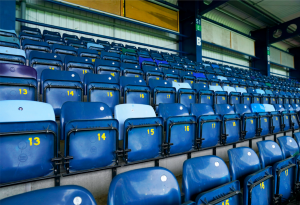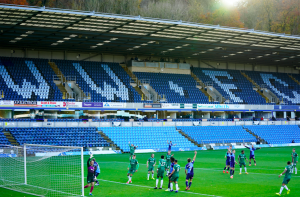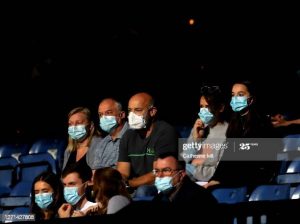With No Fans in EFL Grounds Anytime Soon, is this the Beginning of the End?

The sight of no fans in grounds never gets any easier. Commentators cannot help but mention the gaping hole that is left, games feel devoid of importance and often drift as a result. The novelty factor, if there ever was one, of hearing more communication between the players and staff disappeared with a whimper.
The financial toll of having empty stadiums, due to COVID-19, is huge. According to the Deloitte Annual Review of Football Finance 2020, matchday revenue accounted for 21% of total revenue in the 2018/19 season for EFL clubs.
Given that the entirety of this season and the later stages of the 2019/20 season were also heavily affected by COVID, Football League clubs are operating in an unsustainable manner. Clubs are desperately trying to keep their heads above water only to find the air they crave is poisoned. Many are a few months away from asphyxiation.

According to Ian Mather, Cambridge United’s CEO, this is a very real possibility: “First clubs will struggle to pay wages and PAYE [Pay As You Earn tax]. Once they conclude they cannot continue to trade because of lack of cash, clubs will enter into administration. Some may be bought – others will be liquidated. The overall effect on the league could be devastating with fixtures being unable to be completed. It could lead to the collapse of the season.”
The streaming service iFollow has been utilised to cushion the blow of no matchday revenue but it is not enough on its own. “It does not fill the gap left by fans, but it is a help financially. Depending on sales it might make up 20 – 30% of the gap for us. We [Cambridge United] promote sales well and our fans are very supportive. Many clubs will generate less income than we do,” said Mather.
Accrington Stanley are one of the many others struggling to generate revenue this way. For seven matches between 12th September 2020 to 20th October 2020 they generated only £18,450 in income through iFollow.
Owner, Andy Holt, released these figures accompanied by a tweet: “So out of iFollow revenue @ASFCofficial received so far this season £18,450 out of £63,280 (29.3%%). We would have generated £70,000 against Rochdale alone via matchday receipt. Don’t get me wrong, we’re grateful for £18,450. But it is a drowning man clutching at straws.”
When Will Fans Return?
Football clubs need fans in grounds to survive and the actions of the Government belie their rhetoric that they are working continuously to make that happen. The policy to allow fans to watch football inside a pub or a cinema, but not in a stadium, is nonsensical.
Despite clubs such as Cambridge United and Charlton Athletic working scrupulously at the beginning of the 2020/21 season to stage games with fans inside the stadium, employing events consultancy company Movement Strategies to aid the project, they have heard nothing since their successful test events.

According to Mather, there has been no contact between the government and football clubs about fans returning. No timeline detailing fans returning in any capacity, and no communication with the government-backed Sports Technology Innovation Group (STIG), who are described on the Department for Digital, Culture, Media and Sport website as “looking at innovative solutions to enable the return of fans without the need for a coronavirus vaccine”.
Given the latest national lockdown measures due to come into effect on Thursday, clubs are operating on the idea that no fans will be allowed in until next season. “Hey Siri, define unsustainable?”.
Aside from the £10million rescue package the National Football League received in October the government have largely disregarded football. Instead they have opted to give grants to members of the elite, such as James Palumbo, Baron Palumbo of Southwark (estimated fortune of £350million according the Sunday Times Rich List 2018), who received a grant of £975,468 to keep his private members’ club going.
EFL Chairman Rick Parry’s letter, sent on 28th October to the Department for Digital, Culture, Media and Sport has further stoked the flames around government assistance. The situation described by Parry was that without help through the reintroduction of fans and a financial bailout, then many Football League clubs could collapse. The government will surely decline the former and most likely refute the second request, continuing their policy of brinksmanship.
Given Marcus Rashford has done more to feed children left hungry over the half term holidays than the government, the latter’s aversion to helping football is no surprise.
As Parry wrote: “The football public will judge the performance of this Conservative government on how many football clubs remain in business once the pandemic finally subsides. Certainly, those communities that are inextricably linked to their local team will never forgive it if their beloved football clubs are driven into extinction.”
That last sentence encapsulates the issues at hand. Local clubs are community hubs.
Their stadiums are venues for a myriad of things; community police and ward meetings to children’s jiu-jitsu classes. Locals take enormous pride in the team that represent their town and rely on matchday revenue as a pivotal source of income, as was pointed out by the Premier League on 27th October in conversations with the government.
The Football League is where the superstars of the English game are made – in England’s match against Wales on Thursday 8th October, England’s starting 11 had made more appearances in the Football League (1010) than the Premier League (928).

Ultimately a resolution to these problems afflicting the English Football League remains distant. The return of fans is unlikely until next season, so there is a burgeoning need for the government to offer financial aid. One thing is for sure though, if some clubs go the wall then Britain will be much the worse for it.